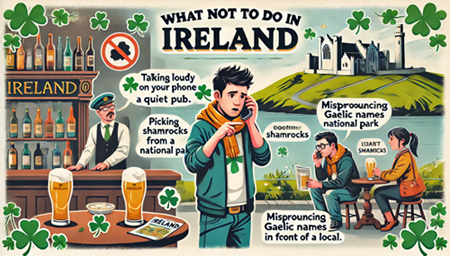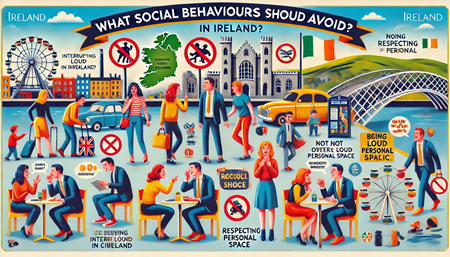
When visiting Ireland, you should not misunderstand Irish hospitality, rush your pint, or drive on the right side of the road. Don't misunderstand Irish hospitality because the Irish are known for their friendliness and warmth, so always be polite and respectful in social interactions. Don't rush your pint because enjoying a Guinness or other local brews is meant to be a leisurely activity, so take your time. Don't drive on the right side of the road because Ireland follows left-hand driving rules.
From my own travels, I've learned just how crucial it is to blend in and respect the Irish way of life. Ignoring local traditions or being loud about sensitive topics can quickly turn a friendly chat sour. Remember, a little awareness goes a long way in making your visit enjoyable and respectful.
What Social Behaviours Should You Avoid in Ireland?

When visiting Ireland, understanding local customs and social etiquette is essential to ensure your trip is a pleasant experience. Here are some social behaviors you should avoid to show respect and blend in with the friendly Irish culture.
-
Avoid being overly formal: The Irish are known for their relaxed and friendly nature. Being too formal in social situations can come off as distant or unfriendly. Engage in light conversation and feel free to share a laugh.
-
Avoid interrupting conversations: Interrupting someone while they are speaking is considered rude. Wait for your turn to speak and listen attentively to others.
-
Avoid being overly reserved: The Irish enjoy good conversation and storytelling. Being too reserved or not participating in the conversation might be seen as disinterest. Share your stories and engage actively in discussions.
-
Avoid boasting or arrogance: Humility is valued in Irish culture. Boasting about achievements or displaying arrogance can be off-putting. Be modest and show genuine interest in others.
-
Avoid making insensitive jokes about Irish culture or history: Ireland has a rich and sometimes painful history. Making jokes or insensitive remarks about Irish culture, history, or politics can be deeply offensive. Be respectful and seek to learn more about the culture.
How to Avoid Offending Locals In Ireland?
To avoid offending locals in Ireland, understanding the social nuances and respecting cultural norms is crucial. In my travels to Northern Ireland, I quickly learned that the Irish person pride themselves on their hospitality and straightforward communication. Engaging positively with these traits can make your stay much more enjoyable. However, a lack of awareness about certain local customs can easily lead to misunderstandings. It's important to remember that the Irish value humor and light-heartedness but are also deeply attached to their historical and cultural values. Below are specific pointers to help you navigate social interactions in Ireland without offending the locals.
-
Don't Talk Loudly in Public: Irish people, including those in Northern Ireland, generally speak in moderate tones; speaking loudly, especially in enclosed spaces like pubs or restaurants, can be perceived as intrusive and disrespectful.
-
Avoid Sensitive Topics: It's wise to steer clear of discussions on religion and politics unless your Irish host initiates them. These topics can evoke strong opinions and may lead to discomfort or heated debates, which are best avoided especially if you're unfamiliar with the local sentiments. Mentioning sensitive terms like the Irish Car Bomb cocktail can also be offensive due to its historical connotations.
-
Respect the Queue: Queuing is a sacrosanct practice in Ireland. Whether it's at a bus stop, in a cafe, or at an ATM, cutting in line is seen as a major breach of etiquette. Observing this rule shows respect for the local way of life.
-
Tip Appropriately: Tipping is not as regimented in Ireland as in some other countries, but it is customary to leave a 10-15% gratuity in restaurants if the service meets or exceeds expectations. In pubs, tipping is less common unless you're at a table and receive table service.
-
Do Not Mock Accents: During my first visit to Ireland, I learned that even playful attempts at imitating the local accent might not be taken kindly. The Irish take great pride in their regional dialects and linguistic heritage; mocking or mimicking can be viewed as offensive.
-
Learn a Few Local Phrases: Demonstrating an effort to use some basic Irish phrases such as "thank you" (Go raibh maith agat) or "please" (Le do thoil) can endear you to the locals. It shows respect and a genuine interest in the culture. Avoid using any Irish swear words, as these can be easily misunderstood and cause offense.
By adhering to these guidelines, you can foster a more genuine and enjoyable interaction with the Irish person, showcasing respect and understanding for their customs and way of life. Understanding Irish history can also provide valuable context, enriching your visit to Ireland and helping you connect more deeply with the locals.
If you plan to visit Ireland, keep these pointers in mind to ensure a respectful and enjoyable experience.
What Cultural Sensitivities Should You Be Aware Of In Ireland?
Understanding cultural sensitivities in Ireland is crucial to ensuring a pleasant and respectful visit. Irish culture is rich with traditions and deeply rooted values that visitors should be aware of to avoid misunderstandings or offense. During my travels to Ireland, I found that being mindful of local customs and etiquette significantly enhanced the interactions I had with locals. Here are some key points to keep in mind:
-
Avoid Discussing Religion and Politics: These topics are often deeply personal and sensitive. It's wise to steer clear of these subjects unless brought up by your Irish host. This is particularly important given Ireland's past, marked by complex political and religious history.
-
Don’t Overlook Queuing Etiquette: Always respect the queue, whether it's at a bus stop, in a shop, or waiting for a pint at one of the old school trad bars. Jumping the queue is considered very rude.
-
Be Cautious with Humor: Irish humor can be dry and sarcastic. While engaging, it’s best not to attempt jokes about sensitive historical issues or stereotypes. Proper planning on this front can prevent misunderstandings.
-
Respect the Irish Language: In Gaeltacht areas, where Irish is the first language, try to use basic Irish phrases. This shows respect and effort to engage with Ireland's culture.
-
Mind Personal Space: Personal space is valued in Ireland. Maintain a respectful distance during conversations to avoid discomfort. This is a reflection of the traditional values held in both parts of the island, which are actually two separate countries.
Remember, a little sensitivity goes a long way. I personally found that respecting these cultural norms not only avoided potential faux pas but also opened doors to richer, more authentic experiences in Ireland. Engaging with the locals using a bit of Irish slang can also enhance your interactions and show your appreciation for their culture.
What Should You Avoid When Using Public Transportation?
When using public transportation in Ireland, what should you avoid? Navigating through the robust network of buses, trains, and trams in Ireland offers a scenic and efficient way to explore the entire country together. However, it's crucial to be aware of certain etiquettes and practices to avoid discomfort or inconveniences. Based on my own experiences, I've found that observing local customs and being considerate of other passengers can significantly enhance your transit experience.
-
Do not talk loudly or use your phone’s speaker. Public transportation is often a quiet zone where passengers appreciate a peaceful journey. Speaking loudly or playing music without headphones can be particularly disruptive and is considered impolite.
-
Avoid eating smelly food. While snacking is generally acceptable, consuming foods with strong odors can be unpleasant for fellow passengers. Opt for less invasive snacks to maintain a comfortable environment for everyone on board.
-
Don't block the aisles or doors. Space is at a premium on crowded buses or trains. Always ensure your bags are tucked away safely and avoid standing in doorways or aisles. This not only helps in maintaining smooth passenger flow but also ensures safety during transit.
-
Never skip the queue. Queuing is an integral part of Irish culture, and jumping the line is frowned upon. Always wait your turn when boarding public transport; it’s a sign of respect and order.
-
Avoid using seats designated for the elderly or disabled. These seats are reserved for passengers who need them most. Even if the transport seems empty, it’s best to avoid these seats unless absolutely necessary.
-
Do not forget to tap on and off with your transit card. This is crucial for fare calculation on services like the Luas or Dublin Bus. Failing to tap on and off can result in penalty fares, which could add an unexpected cost to your travel.
Respecting these guidelines not only helps maintain a pleasant atmosphere but also ensures that you and other passengers have a smoother and more enjoyable travel experience. Ignoring them can lead to fines or embarrassment, detracting from your Irish adventure.
What Driving Mistakes Should You Avoid In Ireland?
When driving in Ireland, avoid driving on the right side of the road, as Ireland follows left-hand driving rules. Do not underestimate narrow, winding rural roads; drive cautiously and be prepared for sudden turns. Avoid speeding, especially in residential areas and near schools. Do not ignore road signs and local traffic laws, and always wear your seatbelt. Lastly, avoid driving under the influence of alcohol, as Ireland has strict drink-driving laws.
Not Checking the Road Side
In Ireland, always remember to drive on the left side of the road. This can be disorienting if you're from a country where driving on the right is the norm. I learned this the hard way when I automatically went to the right and nearly caused an accident. It's a simple rule but crucial for your safety and the safety of others.
Ignoring Speed Limits
Speed limits in Ireland may vary more frequently than you're used to. Rural roads can quickly change from 100 km/h to a much slower limit as you enter small towns. Adhering to these limits is essential, not only for legality but also to navigate safely through unfamiliar territories.
Neglecting Local Driving Customs
Irish roads can be narrow, winding, and sometimes shared with farm animals or tractors. Local drivers are accustomed to these conditions and may drive confidently. As a visitor, always stay alert, drive cautiously, and be prepared for sudden stops or narrow passes.
Overlooking Rental Car Insurance
Always opt for a comprehensive rental car starting from your first time of arrival in Ireland. Roads can be tricky, and the likelihood of scrapes or minor accidents is higher, especially in rural areas. Ensuring you have appropriate insurance cover can save you from potential hefty fees for repairs.
What Are Common Mistakes in Restaurants and Pubs In Ireland?
Navigating the social and dining scenes in Ireland requires an understanding of local customs to avoid faux pas. From my experiences, I've learned that the Irish place a high value on politeness and the informal atmosphere of their pubs and restaurants. Knowing what not to do is just as important as knowing what to do. Here, I will share insights into common mistakes tourists might make, ensuring you can enjoy your meals and drinks without unintentional gaffes.
Assuming Waitstaff Will Always Bring the Bill
In Ireland, it's common to go to the bar to pay, especially in pubs. Don't sit waiting for the bill; you may need to ask for it or head directly to the bar. This practice speeds up the process and aligns with the casual pub culture.
Over-tipping
While appreciated, tipping in Ireland isn't as obligatory or generous as in the United States. Typically, leaving a 10% gratuity in restaurants is sufficient. In pubs, tipping isn't customary unless you're at a table and receive exceptional service. Remember, excessive tipping can sometimes be seen as ostentatious.
Ordering "Irish Car Bombs" or "Black and Tans"
This mistake is particularly grievous. Both drinks are associated with sensitive historical events in Ireland. Requesting or drinking them can cause offense due to the painful memories they evoke. Opt for other popular local beverages like a pint of Guinness or an Irish whiskey instead.
Ignoring Local Eating Times
In Ireland, eating times can be earlier than what some tourists are used to. Lunch typically runs from 12 to 2 PM, and dinner from 6 to 9 PM. Arriving late can mean limited menu options or kitchen closure, particularly in smaller towns or rural areas. Always check the opening hours and try to adapt to these local customs.
What Local Customs Should You Respect In Ireland?
When visiting Ireland, it's important to respect local customs to ensure a pleasant and respectful experience. Here are some key customs to keep in mind:
-
Politeness and Greetings: Always greet people with a friendly "hello" or "hi." Politeness is highly valued, and a warm greeting goes a long way.
-
Punctuality: Be on time for social engagements and appointments. Punctuality shows respect for others' time.
-
Respect for Personal Space: While the Irish are friendly, they also value personal space. Avoid standing too close or being overly familiar with strangers.
-
Queuing: Always queue in an orderly manner and wait your turn, whether at a bus stop, in a shop, or at a pub.
-
Buying Rounds in Pubs: In pubs, it’s customary to buy rounds of drinks for your group. If someone buys you a drink, it's polite to return the favor.
-
Modesty and Humility: The Irish value modesty and humility. Avoid boasting about personal achievements or wealth.
-
Respect for History and Culture: Be respectful when discussing Ireland's history, culture, and politics. Avoid making insensitive jokes or remarks.
-
Tipping: While tipping is appreciated, it’s not as customary as in some other countries. A 10-15% tip in restaurants is generally sufficient, and tipping for drinks at the bar is not necessary.
How to Show Respect at Historical Sites In Ireland?
To show respect at historical sites in Ireland, it's crucial to maintain a quiet demeanor and adhere strictly to any posted rules. These sites hold deep cultural and historical significance and demand reverence.
Avoid touching ancient structures or artifacts, as even minor contact can cause damage. I recall the hushed awe at the Rock of Cashel, where the ancient stones seem to absorb every sound. It’s vital to preserve that atmosphere for all who visit.
Do not take anything from the sites. When I visited the Hill of Tara, the untouched natural elements highlighted the importance of leaving historical sites as they are found.
FAQs On What Not To Do In Ireland
1. Is it acceptable to ignore local customs and traditions in Ireland?
No, it is important to respect and observe local customs and traditions when visiting Ireland. Disregarding these can be seen as disrespectful.
2. Can I refuse a third person a drink offer in an Irish pub?
It is polite to accept a drink offer in an Irish pub or at least propose an alternative like a non-alcoholic drink. Refusing outright might offend.
3. Is it okay to discuss sensitive historical topics loudly in public places in Ireland?
Avoid discussing sensitive historical and political topics loudly in public places. Such discussions are best approached with sensitivity and awareness of the historical context.
4. Should I tip service staff and bartenders in Ireland?
Tipping is customary in Ireland; service staff and bartenders generally expect a tip for good service. A tip of 10-15% is typical.
5. Can I rely solely on credit cards for payments in Ireland?
Carry some cash, as not all places, especially in rural areas, may accept credit cards. Depending on only credit cards can be inconvenient.
